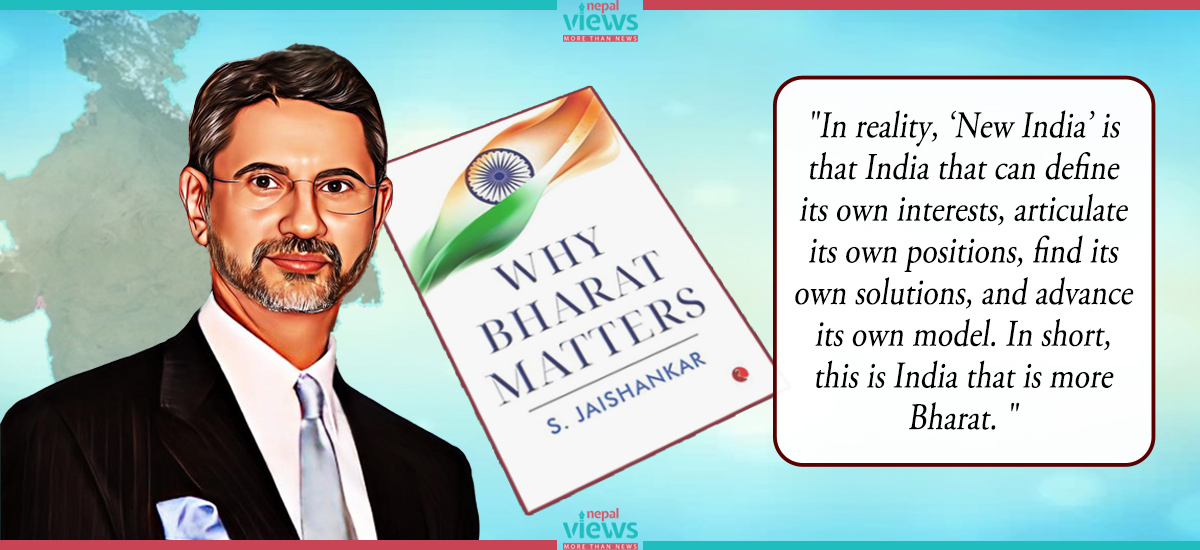India’s Minister of External Affairs S. Jaishankar’s new book – Why Bharat Matters – has just hit the markets. It must be noted that he has not used the commonly used English name of India, but has instead used the Hindi-Bharat. It can be felt that long underlying India versus Bharat discourse in the Indian political scene has now reached new heights or come to a critical point with the opposition’s India coalition and S. Jaishankar’s Bharat Matters.
In the perspective of ‘Bharat Dialogues’, Jaishankar’s thoughts, thinking, approach, and strategic planning always carry weight. He is not only the sitting Minister of External Affairs but is a career diplomat having been India’s ambassador to important nations like USA and China. He was the Secretary of the Ministry of External Affairs before becoming the Minister. He has not only observed the interrelation between Indian politics and diplomacy first-hand but also practiced it.
Jaishankar’s Nepal nexus is equally strong. He had landed in Nepal as the special envoy of the Indian Prime Minister Narendra Modi a few days before the proclamation of the new Constitution 2015. Thereafter the Nepal-India relations turned sour. What happened during his visit then, for the strain relations so bad, is still unknown. He has returned recently visiting Nepal again.
This book is a collection of 11 essays by S. Jaishankar. In the book, he has discussed in detail where, how, and why India’s position in contemporary world politics, economy, and geopolitics holds special significance and how India is an ’emerging world power’.
Jaishankar stresses the point that the ascension of the Bharatiya Janta Party to power in India has taken place at a time when the world is going through an uncertain and unpredictable phase. This uncertainty and unpredictability can be an opportunity for India’s rise. This is similar to the situation when the conflict between the European Axis and the Allies during World War II provided the base for the USA’s rise.
Jaishankar does not hide the fact that he considers the USA and China as the contemporary great powers and India as the rising power. He believes that the strong power struggle between the two powerhouses – the USA and China – not only imposes challenges and risks to the emerging powers but also enhances possibilities and opportunities. It can be easily understood that the current Indian establishment’s foreign policy and diplomatic relations are based on the premise that the more uncertainties in the world, the greater the opportunity for expansion of India’s role!
Three years ago, he published the book The India Way: Strategies for an Uncertain World. In that book, the foreign affairs strategy he proposed and the Indian establishment wanted to practice was to ‘engage the US, manage China, cultivate Europe, reassure Russia, bring Japan into play, draw neighbors in, extend the neighborhood and expand traditional constituencies of support’.
He does agree, in the new book, that India was not equally successful on all these fronts. He has experienced that some relations have been more complicated than expected. He states that a lot of unanticipated events do occur in international relations. The essence of foreign policy is not to hope that such events do not occur but to tackle them adroitly efficiently and effectively. Such an approach is critical.
Jaishankar starts the book with an account of his first meeting with the current Prime Minister Narendra Modi in 2011. He was the Indian Ambassador to China at the time. Modi, then a Chief Minister of the State of Gujarat, was on a visit to China. The United Progressive Alliance (UPA) had formed the government in India led by Manmohan Singh. Modi was considered a leader of the opposition party. It was the duty of Ambassador S. Jaishankar to follow the foreign policy directives of the Manmohan Singh government.
Jaishankar writes that he was impressed by Modi’s thinking and personality during this complex situation. Modi sought his advice on what he should or should not be talking about with the Chinese officials and wanted to know what the national stance of India was. Despite being an opposition leader in India, Modi stated that he would not go against national interests and would talk to his Chinese counterparts to further the Indian government’s agenda.
Sovereignty and anti-terrorism were the main agenda of the Indian government at that time. In addition to these, it is reported that Modi had since becoming the Chief Minister of Gujarat wanted to understand the national interests of India, and did not want to contradict these. He highly regarded China’s infrastructure development, economic prosperity, and technology.
Modi came to power after the parliamentary (Lok Sabha) election of 2014. Jaishankar was the ambassador to the US at the time and played a critical role in maintaining relations between Prime Minister Modi and President Barrack Obama. According to Jaishankar, the Indian diaspora, technology, investment, and development were Modi’s special interests in the US.
Jaishankar believes that India’s recent gains in the international arena are due to Modi’s special leadership abilities. He feels that Prime Minster Modi possesses a special leadership skill and the ability to get along with everyone creating good chemistry. He openly praises Modi’s ability to foster camaraderie with all kinds of leaders – from the democratic leaders of the West to the rulers in the Gulf region.
The current scenario of quality of administration and governance, the renaissance of civilization, large physical infrastructures, embracing Indian norms, values, and traditions with modern science and technology, the smooth endorsement of nationalism within the country and internationalism outside the country including optimism in democracy all point to the New India that is more Bharat.
Jaishankar ascribes three main events responsible for increasing the risks to the Indian interests in the contemporary world. One, the India- China border disputes, two, the Ukraine war, and three, the conflict in West Asia. He feels that the new strategy of India’s foreign affairs should be to adopt a ‘firm plan for a rise in power amidst the serious unpredictability.’ He reasons that a strong combination of polity, economy, demography, culture, and ideas is the foundation for the rise of India’s power in the world.
These claims are not baseless. India has become the most populous country in the world in 2023 overtaking China. India is already reaping the demographic dividend. India has become the target of investment of multinational companies eyeing the increasing size of the middle class and the large consumer base. It has already overshot China in economic growth rate and emerged as the fifth-largest economy in the world.
Jaishankar’s strategy for a steady plan for a rise in power amidst the world’s unpredictability is an important facet of internal politics also. There will be elections for Lok Sabha this year. Bharatiya Janata Party and Prime Minister Narendra Modi running for a third term. This is inextricably linked to fulfilling the ambition of a ‘hat trick’ of confirming political legitimacy by making claims of the largest middle class and the third largest economy in the world.
According to Jaishankar, international relations for the last quarter of the century have been dominated by five phenomena. These include globalization, rebalancing, multipolarity, the impact of technology, and the games that nations have always played. East-West polarization and North-South division as equal challenges facing the world.
Apart from these five dimensions, there is a fixed decisive factor defining India’s foreign policy –national security. He says that diplomacy is always tied to national security, there can be no question of compromising on it.
What is national security for India? He has identified and defined this question well. The priority part includes anti-terrorism, border disputes with China, and matters tied to Pakistan. The second priority is good relationships with neighbors. This includes relations with Nepal, Bhutan, Bangladesh, Sri Lanka and Maldives. The 2015 border agreement with Bangladesh is considered a significant success in this regard.
The third priority area of India’s national security is the security of the maritime zone. For this, apart from Sri Lanka and Maldives, the importance of Asian, island states and ocean regions are emphasized. Special emphasis is accorded to the relationships with Mauritius and the UAE.
The fourth important factor for national security, in his opinion, is separatist movements, religious fundamentalism, extremism, and communalism existing within the country. He reasons that global terrorism should not be allowed to be linked to such trends in the country.
Another dimension of this new book by the External Affairs Minister Jaishankar is to give an account of the accomplishments in foreign affairs and diplomacy during the ‘Modi Era- Golden Era, Modi Kaal – Amrit Kaal.’ Within this, the G-20 presidency and summit, International Yoga Day, advocacy for solar energy at the COP-21 in Paris in 2015 and setting up the International Solar Alliance and Center for Disaster Resilient Infrastructure, holding the UN Security Council’s counter-terrorism meeting at the location of the Mumbai 26/11 event, COVID-19 vaccine world leadership, use of neighbors first policy, Quad partnership and exit from Regional Comprehensive Economic Partnership (RCEP) negotiations, good relations with Russia despite Ukraine war and oil purchase agreement, assistance to Sri Lanka to bail it out of the economic crisis, I2U2 (India, Israel, UAE, and US) and IMEC (India-Middle East-Europe Economic Corridor) and Developments such as Asia-Pacific Economic Cooperation, viewpoint on looking at Palestine and terrorism differently, and expanding the role in BRICS, etc. are discussed.
The main accomplishments within the country are the repeal of Article 370 of the Constitution, emphasis on innovations and start-ups, the progress during the COVID-19 lockdown period, the success of Chandrayaan-3 and the emergence as a new lunar power, becoming the third largest economy in the world, orientation towards achieving sustainable development goals, rapid economic growth and digitized India. This list also includes the promotion of millet from a low-grade food to the highest-class food (Shree Anna) with a special farming program to improve world food security and the right to food.
At a time when the criticisms of Indian democracy were being labeled as weakening, he talks about de-risking democracy and the necessity to tie it up with the world economy to ensure the establishment of a sustainable and stable supply chain. He states that a further decentralization of the world economy is the practical solution to the existing concerns. He rejects the criticism of the disintegration of the Indian democracy and extols delivering democracy.
Jaishankar’s book attempts to establish the concept of a “civilizational state” as a fundamental pillar of Indian politics. He talks about being a friend of the world (Viswa Mitra) and the world as a family ( Basudaiva kutumbakam) with special importance. He claims that epics like Ramayan and Mahabharat have a common correlation with the contemporary state of governance in India. Mahabharat and Ramayan encourage the practice of political reality and rule-based governance respectively. He repetitively uses references to Ram Rajya (the reign of King Ram as a utopian rule) and Ramayan.
He says that life is not a choice between black and white. The ability to make consistent decisions amid complexity is a basis for success. India can become a true power only when it becomes a true Bharat. He tries to reconcile the conflict between ‘India’ and ‘Bharat’ stating that the – ‘New India is even more Bharat.’
He claims in reality, ‘New India’ is that India that can define its interests, articulate its positions, find its solutions, and advance its model. In short, this is India that is more Bharat.
In this 226-page long book, he does not talk about SAARC which might have indicated that SAARC is not India’s priority.
His response to the question of what matters in India’s emergence as a rising power in the contemporary world includes the success of Chandrayaan (rocket to the moon) and the emergence as a space power, G-20 leadership, democracy that can deliver, abundance of talents, growth in strategic engagements, propounding concepts of ‘world is a family’ and ‘India is a friend of the world,’ multipolarity, rebalancing, and civilizational state.
This book of Jaishankar will be of special significance to those who are interested in current concepts of world politics, economic and diplomatic environment, South and South East Asian geopolitics, and India’s foreign policy.











